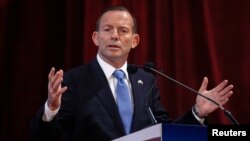The Australian government is to provide military and humanitarian aid to Ukraine. Canberra is also offering to join U.S.-led air strikes against Islamic State militants. Australian Prime Minister Tony Abbott has previously branded Russia a “bully” over its actions in Ukraine and this week he compared Islamic State extremists in Syria and Iraq to a “death cult”.
The Abbott government will now send military advisers to Ukraine, while its aircraft have begun transporting weapons to Kurdish fighters in northern Iraq. Australian warplanes are also on standby to join U.S. airstrikes on Islamic State militants if needed.
But as the conservative prime minister engages in a more interventionist foreign policy, there are fears that he risks overstretching his nation’s armed forces. They have traditionally been small, yet well resourced and sophisticated. But James Brown, a former Australian army officer and military analyst at the Sydney-based Lowy Institute, is critical of Canberra’s policy in Eastern Europe.
“It is hard to understand how a military deployment to Ukraine is in Australia’s national interests, given, as you say, [that] we didn’t have diplomatic representation there a month ago," he said. "I think there is a real danger now that Tony Abbott finds himself over-committed with his use of military force. He came to power claiming a foreign policy that would be more Jakarta-orientated than Geneva-orientated. Now Australia finds itself contributing soldiers into the Ukraine - into a European war. It finds itself contemplating contributing significant forces to Iraq and Syria, and all the while we have still got issues in our region that we are responsible for if they flare up.”
The growing list of military commitments has prompted a lengthy debate in Australia's senate over parliament's role in such deployments.
Senator Christine Milne, leader of the Greens party, told fellow lawmakers parliamentary approval must be required for any military commitments abroad, to prevent "mission creep." She used as an example the humanitarian effort to help refugees in Iraq that grew into an extensive military operation.
“We have had the prime minister engage in what can only be described as 'mission creep,'" she said. "We started out with humanitarian assistance, which the Greens totally support, taking water and food and supply drops to people in desperate need. Then it went to [being involved] in a force ... transporting weapons into northern Iraq.”
Underpinning Australia’s vocal forays into international crises is its longstanding military alliance with the United States that dates back to the early 1950s. Analysts say that Canberra has become one of Washington’s key security partners as it seeks to diffuse crises in Eastern Europe and the Middle East.
